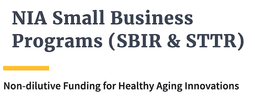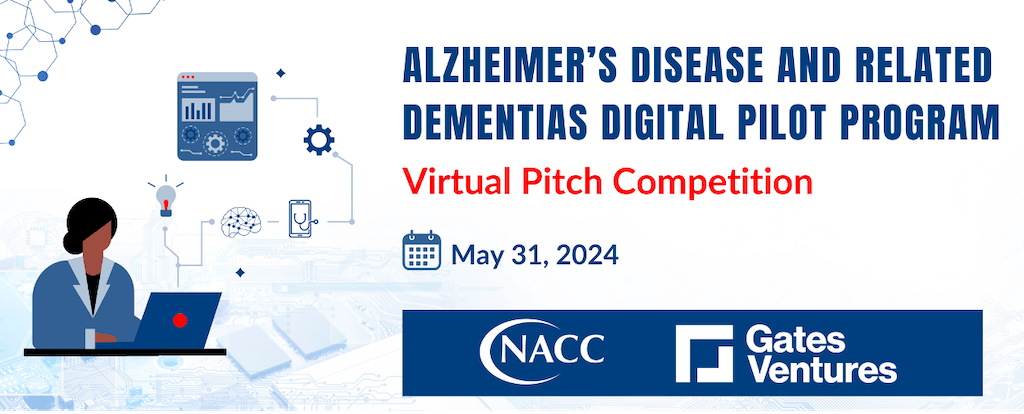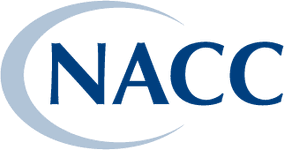
Two proposals were selected for funding after a rigorous review process, with input from digital health experts across industry, government, and academia, culminating in a public pitch competition.
Missed the Pitch Competition? Catch the live recording here
Program Overview
Alzheimer's Disease and Related Dementias (AD/ADRD) research is entering the digital age! There is a huge opportunity to leverage digital tools to advance AD/ADRD research and discovery and make this research more comprehensive. A key focus of this award program, a partnership between Gates Ventures and National Alzheimer's Coordinating Center (NACC), is to accelerate the pace of digital innovation in AD/ADRD and to facilitate impactful collaborations between academia and industry. This award will create pathways for digital technology to be applied within the Alzheimer's Disease Research Centers (ADRC) network which serves as a model for the global AD/ADRD community. The data collected through these awards will be integrated with other standardized data modalities at NACC and made freely available to researchers everywhere. We are committed to working with awardees to scale successful projects across the full ADRC network and beyond. Together this data will open the door to better early detection, treatment, and prevention of AD/ADRD.
About the Digital Biomarker Pilot Program
The goals of this program are to:
- Accelerate impactful digital data collection and sharing across the ADRC Program to advance AD/ADRD research and discovery.
- Leverage technology to capture richer and more objective data with less burden for participants and ADRCs.
- Advance the development and/or validation of digital biomarkers for early detection, diagnosis, prognosis, or monitoring.
The selection committee will choose one to three pilot projects and award between $250,000 to $ 1,000,000 (direct costs, 15% indirect cap) for one to two-year digital pilot projects. Award amounts will be based on the stage and scope of the pilot projects proposed. Funding will be provided for pilot projects that leverage technology to enable richer and more objective data collection with less burden for participants and ADRCs and that advance the development and validation of digital biomarkers.
Data Sharing Requirements
All data generated or used in each pilot project must be made accessible to the research community through the National Alzheimer's Coordinating Center (NACC) Data Platform.
Please note: Pilot projects and their partnering companies are expected to share raw digital data files with NACC.
- Add research value and enhances metrics
- Reduce burden: projects must demonstrate how they will reduce burden on patients and/or providers and medical center staff
- Involves multiple ADRCs
- Demonstrates scalability (ADRCs and beyond)
- Be amenable to open science experiments such as data challenges down the line
- Partnering companies must provide the raw digital files to NACC (some raw data required, companies may still protect IP as needed)
- Sleep
- Movement and/or Phone gyroscope measures
- Fall detection
- Mood State
- Speech
- Video
- Language
- Eye tracking
- Digitized UDS (Uniform Data Set) and non-UDS
- Diet
- Driving
- Keystrokes
- Wearables devices (e.g. smart watch)
- Single-Sensors
- Multi-sensor
- Mobile/tablet apps
- Smart home systems
- Virtual and augmented reality platforms
- Desktop/web apps
- Deep machine learning-AI-driven Algorithms
- Single Digital Modality Processing Software
- Multi-Digital Modality Processing Software
- Large Language Models
Timeline
- October 19, 2023: RFA Announced and Applications period opens
- February 21, 2024: Deadline for applications
- March - April 2024: Applications reviewed by selection committee
- May 2024: Pitch Competition
- May - June 2024: One to three winners are selected, and funding is awarded via NACC
- Summer 2024: Pilot projects are launched (pilot length one to two years)
Potential for follow-up support
- Promising digital pilot projects may be scaled to the full ADRC program and eligible for follow-on funding via NACC's U24 renewal.
- Funded Data Challenge using data collected from the pilots selected for funding.
- SBIR/STTR
![SBIR/STTR Logo]()
- AD Diagnostics Accelerator
![ADDF Logo]()
Events
AD/ADRD Digital Pilot Program Pitch Competition
About the Pitch Competition:
Top applicants of the NACC and Gates Ventures Alzheimer's Disease and Related Dementias (AD/ADRD) Digital Pilot Program pitched their proposals to the judge panel in front of a live audience. In pursuit of $250K-$1M in funding, these top teams shared how their pilot projects will leverage digital tools to enable richer and more objective data collection across the ADRC Program and beyond with less burden for research subjects and patients.
This event was an excellent opportunity to learn about emerging digital solutions and how digital data collection is transforming AD/ADRD research and discovery.
View the pitching teams slides:
- EFFECT-AD - Everyday Frequent Functional Evaluation with Crosscutting Technology for AD
- Characterizing sleep-wake activity patterns across the spectrum of AD/ADRD
- CLARIFY - Speech Analysis and Keystroke Tracking for Early AD Detection
- Scalable Next-Generation Smartphone Gait Assessment for Early Detection of AD/ADRD
- Remote Digital Monitoring to Detect Behavioral and Neuropsychiatric Symptoms in ADRD
- Pilot Study to Evaluate VisMET on the Linus Health Platform at Multiple ADRCs
The 6 Finalist Teams
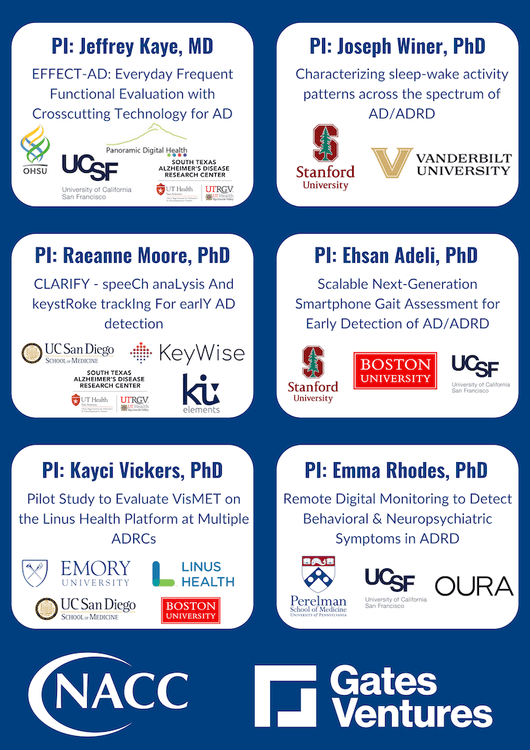
What to expect
- Pitching teams were given 6 minutes to pitch their proposals
- Pitches were followed by 4 minutes of Q&A from our panel of expert judges made up of digital health leaders from across the academic, industry, and government sectors.
- At the end of the event, audience members joined an “Ask Me Anything” Virtual Poster Session where they metwith the pitching teams to ask questions and learn more about their projects.
Event Agenda - Full Agenda
- 15min Event start and introduction
- 70min Pitch Competition: two 30min parts with a 10min break
- 15min Event end and closing remarks
- 10min Break
- 40min "Ask me anything" Virtual Poster Session
Judge Panel
Informational Webinar on the NACC & Gates Ventures AD/ADRD Digital Biomarker Pilot Program - January 22, 2024
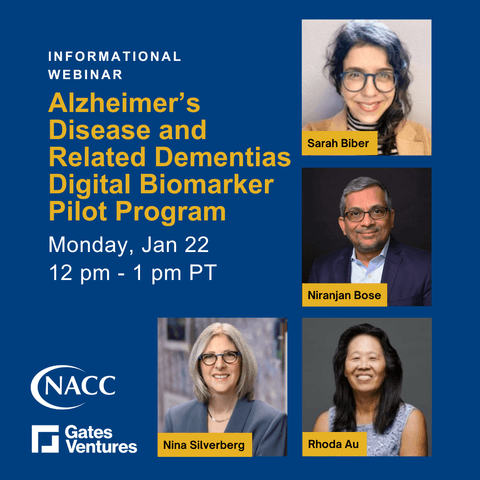
The webinar featured an overview of the new program launched by NACC and Gates Ventures and the value that this data will have on AD/ADRD research and innovation! Our speakers Niranjan Bose, PhD of Gates Ventures, Nina Silverberg, PhD of NIA, Rhoda Au, PhD, MBA of Boston University, and Sarah Biber, PhD of NACC covered highly relevant topics such as how to connect with industry partners from an academic lens and why the ADRC Program is a good testbed for developing impactful digital biomarkers. This webinar wrapped up with a Q&A panel - which has been included in the FAQ section.
Application Review
Our goal is to provide applicants with high-standard, professional assessments of scientific appraisals. The multi-stage process described below is designed to ensure both scientific rigor and fairness in the review of all submitted applications.
Review / Selection Process
Prescreening: All applications will be pre-screened to ensure that they meet the minimum selection criteria (at least 2 ADRC collaborators, reduces burden on patients and/or staff, agrees to data sharing via NACC, budget is within RFA scope, etc.)
Review Committee: Each proposal will be reviewed by at least 2-3 committee members and assigned scores. After initial scores are assigned, reviewers will discuss and determine which applicants will be invited to the next stage of the review process.
Pitch Competition: The top proposal teams (5-10 applications) will be invited to participate in a pitch competition. Selection committee members will attend and discuss each team's pitch to assign final scores and make funding recommendations.
Awardees Selected: NACC and Gates Ventures will determine final funding decisions for 1-3 winning proposals with the selection committee's recommendations. Awardees will be announced.
Proposals will be scored based on the following criteria:
Significance |
|
Innovation |
|
Feasibility |
|
Scalability |
|
Review Committee
Our review committee is made up of experts in scalable digital technologies from across academia, industry, and government. Each application will be scored by 2-3 committee members and assigned an average score.
How to Apply
1. Carefully review the RFA linked here
Application deadline: February 21, 2024
2. Review the mission statement, application restrictions and review policies, and funding policies below
- Mission Statement
- The mission of the National Alzheimer's Coordinating Center (NACC) and Gates Ventures Alzheimer's Disease and Related Dementias (AD/ADRD) Digital Biomarker Pilot (DBP) Awards is to accelerate innovative digital data collection and sharing across the Alzheimer Disease Research Center (ADRC) Program to accelerate Alzheimer's Disease and Related Dementias (AD/ADRD) research and discovery.
- The NACC and Gates Ventures AD/ADRD DBP Awards are seeking to fulfill this mission by providing funding for pilot projects that leverage technology to enable richer data collection with less burden for participants and ADRCs and that advance the development and validation of digital biomarkers. As a public charity, the DBP Awards funding must be used specifically for an approved scientific project that advances this stated mission.
- Application submission restrictions
- Any application not meeting the criteria described above will not be reviewed.
- No person involved in the review of applications may be part of a team submitting an application.
- Page Limits: 1-page project overview, 6-page research strategy (references are not included in this page limit)
- Format requirements: 12-pt minimum font size, margins no smaller than 0.5-inch, PDF format.
- No appendices will be accepted
- Application review process policies
- All applications will be reviewed by the selection committee.
- All pilot project proposals will be evaluated by the selection committee on scientific and technical merit, level of innovation, and investigator, and organizational capabilities and alignment with the goals of the RFA.
- Funding mechanism
- Pilot projects receiving funding will have a subcontract that is awarded through NACC to the partnering ADRCs on the project.
- Allowable and unallowable costs
- This funding may be provided for approved personnel costs, supplies (e.g., consumables, chemicals, animals), small non-durable equipment up to $2,500 per item, consultants, and participant costs related to the collection of data.
- This funding may not be used for cost of living, capital equipment, equipment service contracts, publication costs, or travel (unless pre-approved under special circumstances).
- Up to 15% of additional funding will be provided for indirect costs/overhead.
3. Submit your application
Please review the following application instructions and details below:
- Application instructions
After reviewing the detailed instructions below, please navigate to the REDCap application form to submit your pilot proposal.
This application form will allow you to submit the following:
Application information, includes:
- Project Title or Primary Institution
- Principle Investigators
- Key Personnel
- ADRC Collaborators
- IRB approval status
- Full proposal (in PDF format only)
- Supplemental materials (in PDF format only)
- Full Proposal Details
Formatting Requirements:
- All six proposal body sections should be compiled into a single PDF and uploaded where indicated in the application form.
- Project Overview should not exceed 1 page of written text.
- Sub-sections
2a-2gshould not exceed 6 pages of written text. - Embed figures in the text.
- Use 12pt. font and 0.5-inch margins.
The Proposal Body should include all six sections as detailed here.
- Supplemental Materials
All of the following materials are optional.
If submitting supplemental materials, compile all the materials into a single PDF and upload as "Supplemental Materials."
These materials can include:
- Quotes from vendors or contract research organizations (CROs)
- IRB-ready clinical protocols
4. Review Process
Proposals will be reviewed by the selection committee after all applications have been received on the due date, February 21, 2024. Applicants can expect to hear back on their application status within 1-2 months after the due date.
Proposal Body Details
The Proposal Body should include the following six sections:
- Project overview (1 page limit)
Provide a brief overview of the pilot proposal. Describe what problem this proposed technology will solve. Describe how this proposal will meet the criteria of expanding the collection of richer data with less burden for participants and ADRC staff.
- Project description (6 page limit)
The project description is the central part of the proposal and should contain the eight sub-sections listed below (indicate each sub-section by number in the proposal).
Background and Rationale
- Provide the biological rationale that links the candidate digital measure(s) to disease pathophysiology.
- Provide the biological rationale that links the candidate biomarker(s) to disease pathophysiology.
- Discuss the novelty of the proposed approach and its leading context of use (CoU).
- It is recommended to focus on one CoU, however, if multiple CoU are proposed, please describe additional biomarker categories here and ensure study design will support these additional categories.
Supporting Data
- Provide relevant supporting data.
- Include data that demonstrates how the candidate biomarker(s) is connected to the disease process.
- Provide data for the analytical method such as sensitivity, specificity, accuracy, parallelism, precision, sample stability, and other characteristics
Project Plan and Objectives
- Objectives: List specific aims and milestones with clearly defined go/no-go decision points for advancement of the project.
- Timeline: Use the Alzheimer’s Disease Drug Discovery Diagnostic Accelerator Project Plan Template (.xlsx) to provide a schedule for the completion of the proposed milestones/deliverables for each quarter of the year for each year of funding.
- Discuss critical next steps and/or experiments needed to advance the program to attract additional funding/licensing.
- Outline strategies for commercial scale-up, manufacturing, possible cross-platform compatibility, and regulatory approval, including the timeline for FDA submissions and milestones.
Experimental Design and Methods
- Describe sample collection methods, storage, stability, and extraction procedures.
- Provide details for each analytical method proposed and the measurement methodology.
- Include possible strategies if issues arise and any plans for the development of combined measures that may provide greater validity than an individual measure.
- Include the sourcing of all components of the analytical methods proposed.
- Provide a statistical analysis plan. Include a power analysis to justify the number of participants or samples per group.
- For validation studies, describe the strategies for maximizing reproducibility, including standard operating procedures for pre-analytical, analytical, and post-analytical stages.
- Please describe your regulatory and commercialization strategies.
Description of Investigative Team and Resources
- Describe the investigative team and explain how specific expertise of each member will contribute to completing the study objectives.
- Where internal expertise is not available, include a description of external partners (e.g. consultants, contract research organizations (CROs) that will help to execute the experimental work.
- Discuss the inclusion of any consultants with assay development expertise that were involved in the design of preclinical or clinical studies or the development of the commercialization plan.
- If applicable, discuss relationships with commercial diagnostics platform companies or plans to partner. Summarize the materials, technologies, and/or expertise provided by these collaborators.
Intellectual Property
- Provide information on existing IP and stage of prosecution.
- If no IP currently exists, describe the projected plan to generate IP; note if you expect the project to generate new IP.
- Indicate any freedom to operate issues.
Other Support
- List other financial support, awarded and pending, and include grant title, principal investigator, percent effort of investigator, granting agency, amount, and projected funding period.
- Indicate any overlap between the aims or investigator effort from other funding with the proposed work.
References
- References do not count towards the 6-page limit.
- Budget and Justification (no page limit)
Please complete and provide the following forms in the full proposal PDF:
- PHS398 Form: Complete the template PDF (download here) or Word version (download here). Download instructions here.
- Budget and Justification: Complete the template and provide a brief justification for each line item. Download the template here. NOTE: You will also be asked to submit this as a CSV file in a separate location in the application.
Proposals must outline how they will spend $250K to $1M in direct costs. Additional funding will be provided for indirect costs (up to 15%)
- Proposals do not need to provide budget details for NACC to ingest and share data.
- Please review permissible costs listed in the “Before Getting Started” section above.
- Biographical Information (no page limit)
- Include a NIH biosketch for each of the key personnel listed on this project.
- For instructions, please visit: https://grants.nih.gov/grants/forms/biosketch.htm
- Study Population Worksheet (no page limit)
- Complete the Study Population Worksheet. Download the template here.
- If using specimens from an existing cohort, a letter of support from the PI of the study is required.
- Letters of Support (no page limit)
Letters of support from ADRC’s should be included as part of your proposal.
Contact Us
Please send all questions to naccmail@uw.edu and the NACC team will respond to you within 1-3 business days.
Are you a technology or industry partner interested in being connected with ADRCs who are looking for partners? Contact NACC via the button above.
Partner Information
About the ADRC Program
The National Institute on Aging (NIA) funds 33 Alzheimer's Disease Research Centers (ADRCs) at major medical institutions across the United States. Researchers at these Centers are working to translate research advances into improved diagnosis and care for people with Alzheimer's disease, as well as working to find a treatment or way to prevent Alzheimer's and other types of dementia.
About NACC
The National Alzheimer's Coordinating Center (NACC) functions as the centralized data repository, and collaboration and communication hub for the National Institute of Aging's (NIA's) Alzheimer's Disease and Research Centers (ADRC) Program, which currently includes 33 centers and 4 exploratory centers across the United States.
The National Alzheimer's Coordinating Center was established in 1999 by the National Institute on Aging/NIH to facilitate collaborative research. Using data collected from NIA-funded Alzheimer's Disease Research Centers (ADRCs) across the United States, NACC has developed and maintains a large relational database of standardized clinical and neuropathological research data. In partnership with the Alzheimer's Disease Genetics Consortium (ADGC), the National Centralized Repository for Alzheimer's Disease and Related Disorders (NCRAD), and the NIA Genetics of Alzheimer's Disease Data Storage Site (NIAGADS), NACC provides a valuable resource for both exploratory and explanatory Alzheimer's disease research. NACC data are freely available to all researchers.
About Gates Ventures
Gates Ventures is the private Executive office of Microsoft co-founder and philanthropist Bill Gates and was founded 2008 in Kirkland, Washington, United States. It comprises his personal staff, a think tank on problems of health and global development, and a technology investment portfolio.
FAQs
Program and Program Partners
- Is EEG data included in the (NACC) database?
EEG data is not currently included in NACC’s dataset. Learn more about NACC data here.
- Will this opportunity be repeated next year?
This is a new program launched by NACC in collaboration with Gates Ventures. We have yet to determine whether the program will be continued in following years.
Eligibility and Application Requirements
- When is travel an approved cost?
The RFA states that travel may not be an allowable cost unless special circumstances are approved. Special circumstances may include necessary travel for project activities integral to data collection or the overall project. Please reach out to naccmail@uw.edu to determine if travel costs for your proposal are approved.
- Who should I list as the prime sponsor on my grants and finance documentation?
Please list University of Washington – as NACC will be distributing the subawards for projects who are awarded funding.
- Are non-US based companies eligible for funding?
Yes! Non-US companies are eligible for funding as long as they have at least two Alzheimer’s Disease Research Center (ADRC) Program collaborators.
All data generated or used in each pilot project must be made accessible to the research community through the National Alzheimer's Coordinating Center (NACC) Data Platform.
- Are postdocs eligible to be the PI on the application?
If the PI on the application is a postdoc, most institutions will ask for a faculty sponsor when they submit and go through their internal approval process.
If that is the case for your institution and your proposal is awarded funding, that award may need to be listed under the faculty sponsor's name.
- Is the requirement 2 different ADRCS, or can it be 2 different investigators at a single ADRC?
At least 2 ADRC collaborators from different institutions are required
- Are applicants' budgets held to the NIH salary cap?
As this grant is not funded by NIH, there is no requirement to adhere to the NIH salary caps.
- Are sites under the requirement to adhere to the single-site IRB?
There is no requirement to adhere to the single-site IRB – IRB requirements are met so long as each site is clear to collect the data described in the proposal and share this data with NACC.
- Can the institutions involved in an application submit the budgets separately for the proposal?
Each of the four institutions as well as any technology partners on your application can submit a separated budget for your application. NACC would then setup subawards for each institution to maximize the amount of funding that goes towards the actual research.
- The requirements for the RFA state that "industry partnerships are strongly encouraged" - should we interpret this statement to mean that we should not apply for the program if we are not currently partnered with a wearable device company?
This statement is meant to encourage those applying to have a strong plan for how their pilot proposal will be implemented across several piloting sites. An industry partnership or plan that supports this would make for a stronger application.
- The application asks for IRB approval that seems to be needed at the time of the application. Can you confirm, expand on this?
IRB approval is not required as part of the application process, but a stronger application would include details and/or a timeline about securing IRB approval.
- Regarding the 6-page limit of the research proposal, are f (other support) and g (IP) included in the 6-page limit or can these be added as appendix?
2a-2g, including ‘other support’ and ‘IP’ are meant to be included in the 6-page research proposal.
Partnerships between Academia and Industry
- Are there any specific requirements to put a foreign (non-US) subaward in place?
Yes, there are several requirements that NACC/University of Washington must follow to set up subawards with foreign entities. Please reach out to naccmail@uw.edu for more information.
- What mechanism does NACC have for tech companies to pitch new technologies/proposals to ADRCs?
For the purposes of facilitating partnerships with the purpose of submitting a pilot proposal only – NACC will connect tech companies with ADRC’s who have indicated their interest in being approached by tech companies looking for partners for the NACC & Gates Ventures Digital Data Pilot Program. Email us at naccmail@uw.edu
- Should ADRC researchers also email NACC to get connected with tech companies?
NACC does not currently have a list of possible tech companies to partner with, but feel free to reach out to naccmail@uw.edu and we will connect with the Clinical Task Force Technology Workgroup to determine if any connections can be made.
- Can we partner with international investigators? Can you speak about the issue of tech companies that share IP secrets with certain foreign countries being barred from US SBIR funding?
All applicants are welcome, including international collaborators. As long as the proposal includes at least 2 collaborators from a member of an ADRC.
- What would an ADRC partnership look like for a company with a focused proposal already?
This is highly dependent on the ADRC(s) involved. Some may be open to simply joining as a pilot site while others will want to be more involved in the proposal writing process.
Data and Data Sharing
- Will EEG data be considered a digital biomarker?
Yes, it could be.
- Could you define Raw Digital files? Is that the raw sensor data or may that be up to the company's discretion?
Yes, raw digital files include raw sensor data; a company will need to decide what is possible while protecting IP. For example, sharing raw sensor data but not any derived measures that rely on proprietary algorithms would fulfill the criteria of sharing raw digital data files without exposing company secrets.
- Are there any system requirements for sharing data in NACC’s cloud?
- All data generated or used in each pilot project must be made accessible to the research community through the National Alzheimer's Coordinating Center (NACC) Data Platform.
- NACCID must be affiliated with data
- Documentation on datatype, metadata descriptors, etc. Should be provided
- Tooling & code necessary for QC/processing of data should be provided
- In terms of confidential data sharing, privacy and operation: is the plan to stand up a shared data commons for these initiatives that is based on enforced standards and leveraging cutting-edge technologies such as homomorphic encryption and zero-knowledge proofs, etc.? Or is every initiative going to be using bespoke data collection doing their best to adhere to data sharing standards? As a negative counter-example - during the Covid-19 defense, the various initiatives doing voice-based diagnostics were collecting slightly different data sets for no scientific reason, resulting in the failure of all of their respective machine learning approaches due to limited data - whereas if there were clearly defined and enforced standards their data could have been shared and strengthened each of their proprietary approaches (without harming their IP, etc.)
NACC is currently working with the Global Research Integration Platform team to develop tools to enable better privacy protection, harmonization, and data management and processing. These open source tools will be made available on the NACC website with the assumption that these are first generation tools that the scientific community will iterate on since there are no currently accepted gold standards. Since different data types in general, and digital data in particular will also have nuanced differences, it is likely that there will be a hybrid between recommended approaches that can be used uniformly versus those that will need local customization.


